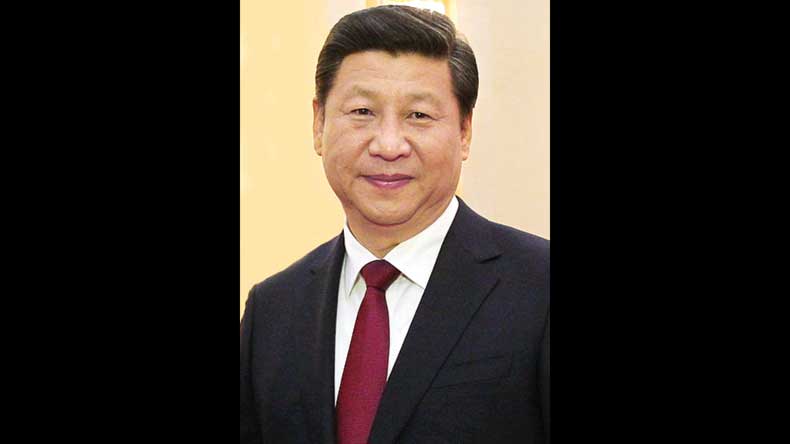Chairman Mao Zedong’s famous dictum “…political power grows out of the barrel of a gun” continues holding ground in present day China, with PLA’s political work system being the principal means through which the Chinese Communist Party controls the “gun”. To that count, the People’s Liberation Army is openly owing allegiance to “core leader” Xi Jinping, with state-run and controlled newspapers carrying full-page expressions of absolute loyalty by military commanders across regions, in an apparent attempt to quell any form of rift between the Party and the PLA, as has been debated frequently. Professional militaries, the world over, foremost serve the survival and interests of the State. In case of China’s PLA, it has been an exceedingly politicised “Party’s army” ever since its inception. Perhaps, the most vital of PLA’s missions is guaranteeing the regime’s enduring survival, above everything else. China’s state-controlled media is known to berate the very idea of “apolitical militaries”.
A year ago, China introduced perhaps the largest military reforms being executed in many decades of the recorded history of China’s military modernisation. The message that Xi Jinping conveyed by means of this announcement was unambiguous: the Party, through the Central Military Commission, remains firmly in control. In fact, Xi has further tightened his grip over the PLA by assuming a more direct role as head of the new Joint Operations Command Centre, which puts him in charge of the operational command of the PLA’s military operations and plans. This new role holds tremendous political significance. The tiers of political work in the PLA are interlocking and reinforcing systems which provide the Party to infiltrate the military hierarchy, beginning with the political commissars, the Party committee system, and the Party discipline inspection system. By constituting the Discipline Inspection Commission specifically for the PLA, and making it answerable directly to the Central Military Commission, Xi has stiffened the noose around China’s military elite—thereby ensuring that the Party’s political control over the gun continues unabated, and the loyalty of the gun remains to the Party, followed by, to the State.
The communiqué released at the sixth plenum of the 18th CCP Central Committee urged the Party to “…closely unite around the Central Committee with Xi Jinping as the ‘core’”. The term “core” attributed to Xi Jinping grants him greater political power amongst the top leadership. Owing to his political capital, his association with the PLA and having witnessed military diplomacy up close, Xi Jinping’s political control over the PLA is far greater than his predecessors, Hu Jintao and Jiang Zemin, who struggled to coagulate their authority during their respective tenures. Senior leadership of the Party, beginning from provinces, regions and provincial-level cities have already begun referring to Xi as their “core leader” and display open allegiance. The Party secretary of Tibet, Chen Quanguo, for instance, announced resolute safeguarding of “…the absolute authority of the party centre under Comrade Xi Jinping as general secretary… Staunchly safeguard, support and be faithful to General Secretary Xi Jinping, the core.”
All these developments are taking place at an opportune time for Xi Jinping, primarily since they will enable him to pick his cohort for the 2017 Congress, in which a new standing committee will be constituted, which is the nucleus of China’s decision-making power apparatus. With 2021 establishing 100 years since founding of the Chinese Communist Party and 2049 ushering in 100 years of the People’s Republic of China coming into existence as a nation-state, realisation of the twin bicentennial goals has remained the nucleus of Xi Jinping’s famous “China Dream”. It is in this backdrop that China’s political leadership’s future would be centre stage in 2017, with the question remaining: Will Xi consolidate his power and seek to retain control for yet another term post-2022, or, would he pave way for an anointed successor during the 2022 Congress?
While the title of “core” leader puts Xi on par with Mao Zedong and Deng Xiaoping, the litmus test for Xi would be ensuring economic stability throughout China and prevail through the economic muddle. Economic steadiness has often been interpreted as an essential pre-requisite to preserve the communist regime’s continuing reign in China. A dwindling economic chart could cause far-reaching social strife—a scenario that any Chinese leader, “core” or otherwise, would dread to grapple with. And to meet this challenge, which could well threaten the regime’s survival, the People’s Liberation Army would be expected to serve as the ultimate guarantor. In all likelihood, the year 2017 will consolidate Xi Jinping’s hold over the political and military affairs of the State. This shall bear critical ramifications for Asia and beyond.

